
This combo photo shows old-style steam locomotives kept in extended service on the Jining-Tongliao railway in north China's Inner Mongolia Autonomous Region, Dec. 7, 2005 (top, photo taken by Zhang Ling); and bullet trains waiting for maintenance at a train depot in Wuhan, central China's Hubei Province, Jan. 20, 2019 (bottom, photo taken by Xiong Qi).
Veteran train driver Zhou Li, 54, has driven all four generations of Chinese trains -- from steam locomotives to high-speed.
Having spent two-thirds of his Spring Festivals driving a train, this year is Zhou's 31st Spring Festival travel rush.

This combo photo shows train driver Zhang Xin working in a locomotive in southwest China's Guizhou Province, Feb. 5, 2004 (top, photo taken by Hou Shaohua); and bullet train driver Zhou Li working during a mission on the Beijing-Tianjin high-speed railway in north China, Jan. 25, 2017 (bottom, photo taken by Yang Baosen).
The Spring Festival holiday is a frenetic travel period in China when hundreds of millions of Chinese return to their hometowns for family gatherings, to visit relatives and friends or just for a break from city life.

This combo photo shows passengers queuing up to board the trains at the Beijing Railway Station during the Spring Festival travel season in Beijing, capital of China, Jan. 12, 1993 (top, photo taken by Tang Zhaoming); and passengers prepare to board the trains after security check at the Lanzhou Railway Station in Lanzhou, northwest China's Gansu Province, Jan. 20, 2019 (bottom, photo taken by Chen Bin).
Zhou Li is one of many Chinese train drivers who have witnessed the fast development of the national railway network in connection with the changes of the world's biggest travel rush.

This combo photo shows station staff members offering hot water for train passengers at the Shijiazhuang Railway Station during the Spring Festival travel season in Shijiazhuang, north China's Hebei Province in 1984 (top, photo taken by Zhao Liansheng); and train attendant Liao Hui of the Nanchang Railway Bureau offering a cup of water for a young passenger on Feb. 6, 2016 (bottom, photo taken by Jiang Kehong).
Since the founding of the People's Republic of China 70 years ago, the speed of trains has increased sixfold while the length of the entire railway system has expanded from only slightly more than 20,000 km in 1949 to some 131,000 km by the end of 2018.

This combo photo shows the first Beijing-Guangzhou direct train leaving the Beijing Railway Station on Oct. 14, 1957 (top, photo taken by Meng Qingbiao); and a Fuxing bullet train passing by the Yongdingmen gate tower as it travels on the Beijing-Tianjin intercity rail, Jan. 25, 2019 (bottom, photo taken by Xing Guangli).
Thanks to this enormous train network, the journey home for 413 million Chinese, the number of people who travel via train during the holiday this year, has become faster, more convenient and more high-tech.
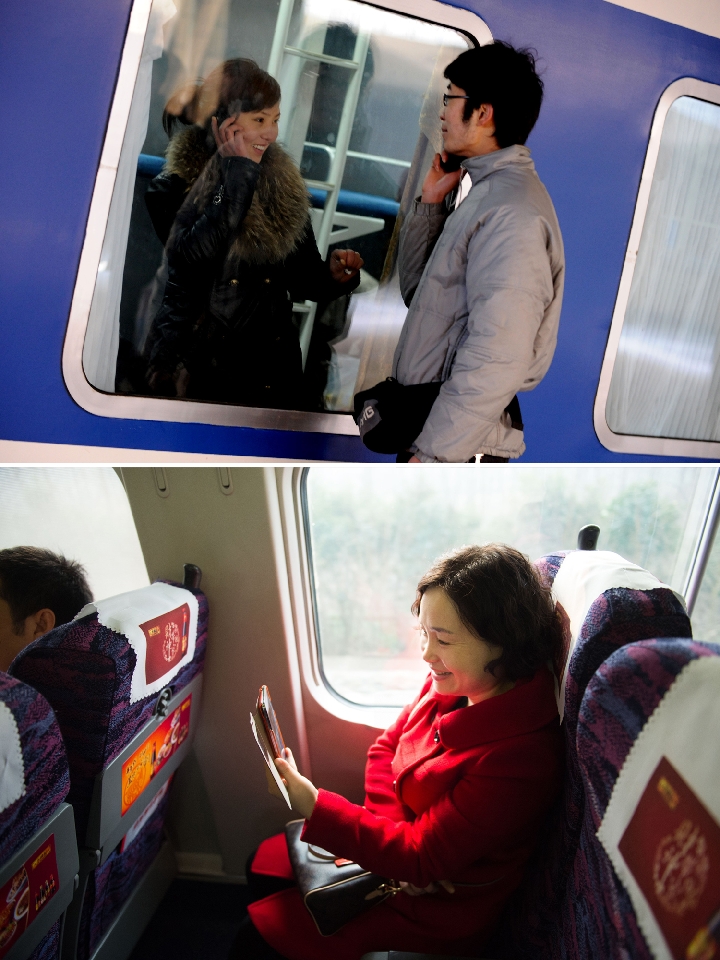
This combo photo shows a couple making a farewell phone call across a train window at the Zhengzhou Railway Station in Zhengzhou, central China's Henan Province, Jan. 23, 2009 (top, photo taken by Zhu Xiang); and a passenger having a video chat with a friend using 4G network aboard a bullet train which travels from Hefei, east China's Anhui Province to Jiangshan, east China's Zhejiang Province, Feb. 4, 2015 (bottom, photo taken by Du Yu).
According to calculations based on archived reports by the People's Daily, some 31 million trips were made via train during Spring Festival 1957, which seems like nothing compared to this year's number.
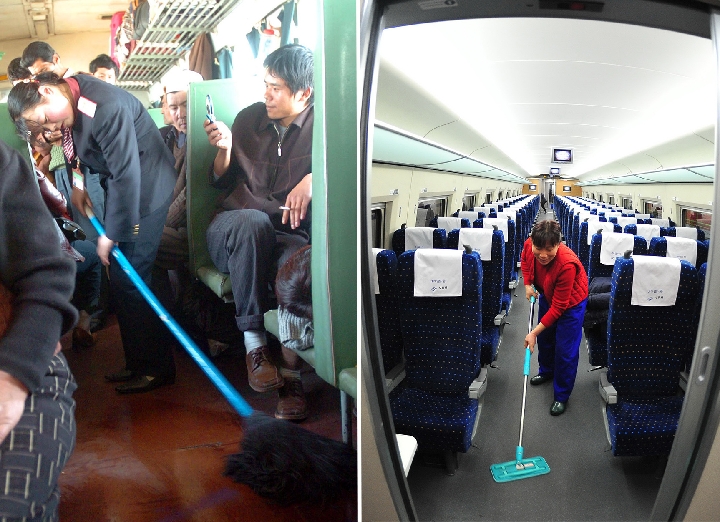
This combo photo shows a train attendant mopping in a train carriage that travels from Urumqi to Kashgar in northwest China's Xinjiang Uygur Autonomous Region, March 10, 2005 (left, photo taken by Sadat); and a worker cleaning a bullet train carriage at a depot in Wuhan, central China's Hubei Province, early on Feb. 10, 2011 (right, photo taken by Cheng Min).
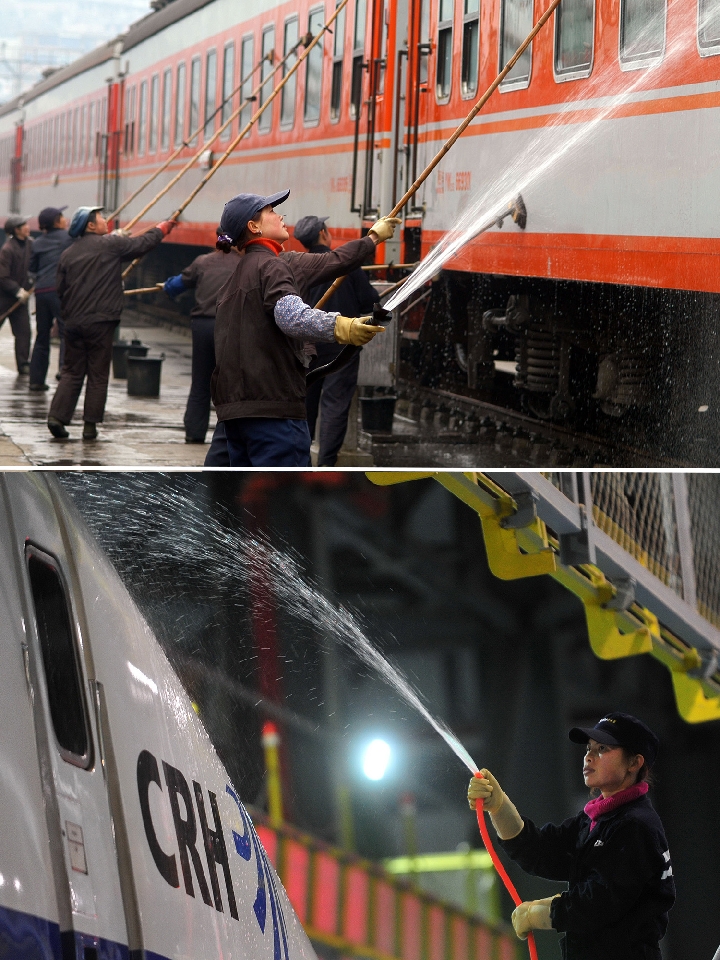
This combo photo shows cleaners washing a train at the end of the Spring Festival travel season at the Guiyang Railway Station in Guiyang, southwest China's Guizhou Province, March 5, 2005 (top, photo taken by Wu Dongjun); and a cleaner washing a bullet train at a depot in Wuhan, central China's Hubei Province, early on Feb. 10, 2011 (bottom, photo taken by Cheng Min).
However, it still exerted a huge pressure on the country's transport system. The People's Daily even carried an editorial in 1959 urging short-distance travelers to walk or use bicycle wherever possible, to ease the burden on the public transport system.

This combo photo shows passengers boarding an old-style green train on a platform at the Genhe Railway Station in Hulun Buir, north China's Inner Mongolia Autonomous Region, on Jan. 31, 2016 (top, photo taken by Lian Zhen); and a bullet train which is about to depart from Chongqing West Station in southwest China's Chongqing, Feb. 12, 2018 (bottom, photo taken by Liu Chan).
Just 10 years ago, standing in carriages filled with passengers and their luggage for a 58-hour trip was ordinary for many. Today, the constantly improving and expanding railway network and the launch of bullet trains means such journeys are less crowded and more enjoyable.

This combo photo shows passengers arranging their luggage in carriage 11 of the train L28 which travels from Fuzhou in southeast China's Fujian Province to southwest China's Chongqing Municipality, Jan. 23, 2003 (left, photo taken by Jiang Kehong); and train conductor Jiang Fei checking the luggage rack aboard a bullet train on the Wuhan-Guangzhou high-speed railway, Jan. 30, 2010 (right, photo taken by Li Mingfang).
Yu Maosheng, 38, said that he used to wait for several hours when queuing for train tickets, and it used to take him more than 30 hours to return home to Linyi in eastern China's Shandong Province from Shenzhen in southern China's Guangdong Province.
Today, the trip between Shenzhen and Linyi has been shortened to 10 hours thanks to high-speed trains.
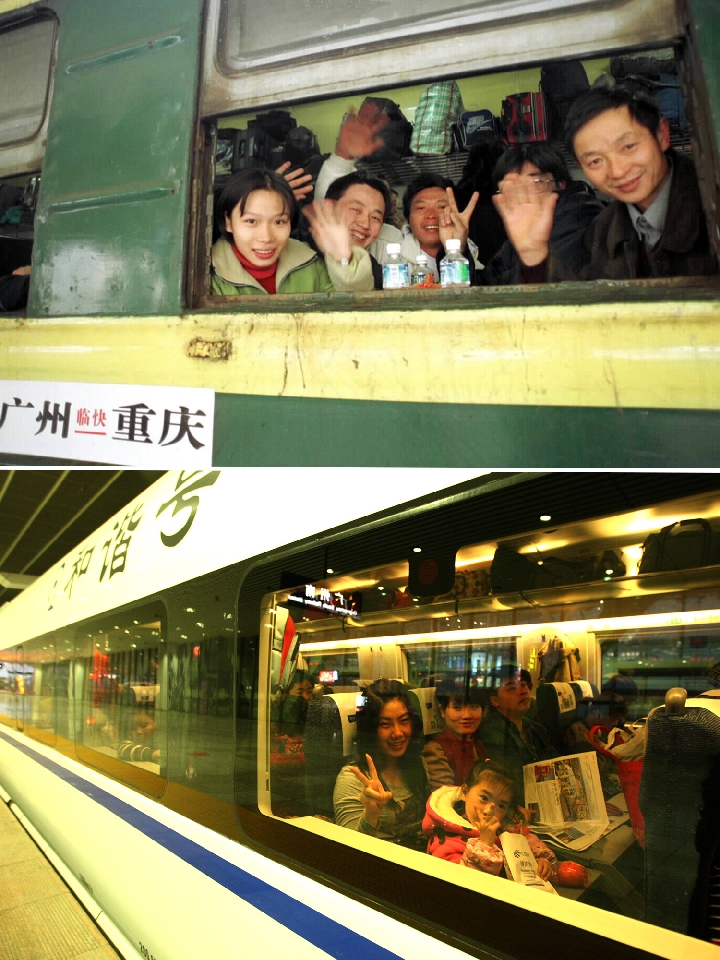
This combo photo shows migrant workers on a train during the Spring Festival travel season for a homeward journey from Guangzhou in south China's Guangdong Province to southwest China's Chongqing Municipality in January of 2000 (top, photo taken by Zhuang Jin); and passengers sitting aboard the bullet train G6102 which departs from the Guangzhou South Railway Station to Wuhan in central China's Hubei Province, on Jan. 25, 2014 (bottom, photo taken by Ding Yong).
In September 2017, Fuxing high-speed trains independently developed by China began to run between Beijing and Shanghai. With a speed of 350 kmh, it is the fastest train in commercial service in the world.
Fuxing trains will be running on the railway between Beijing and Zhangjiakou, in northern China's Hebei Province, when the two cities host the 2022 Winter Olympic Games.
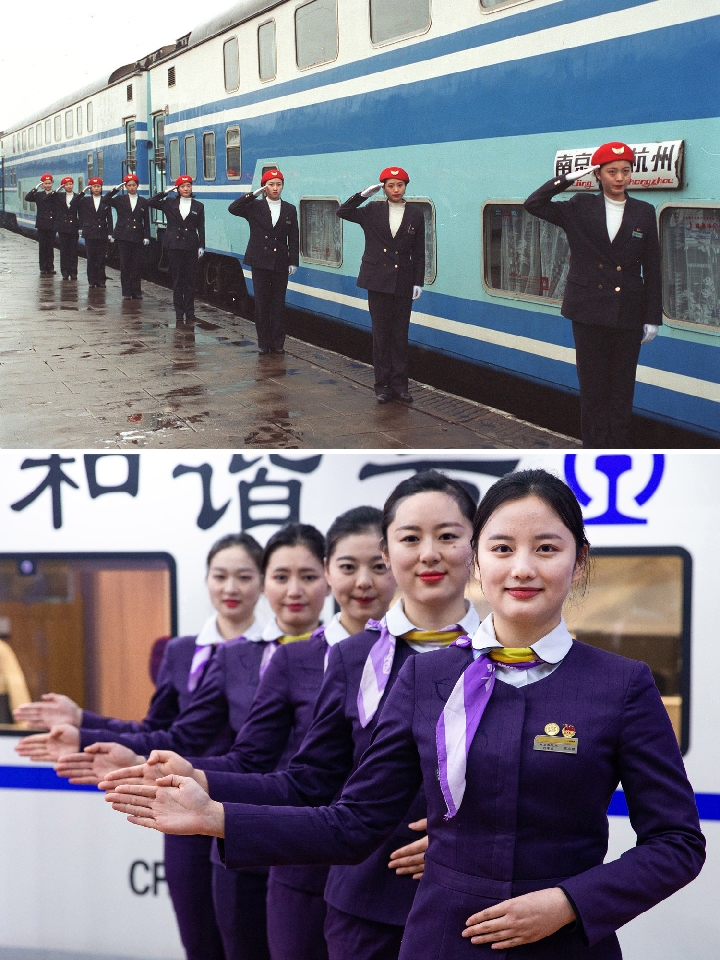
This combo photo shows attendants getting ready to work aboard the train K1/6 during the Spring Festival travel rush in Nanjing, east China's Jiangsu Province in January of 1998 (top, photo taken by Gao Meiji); and bullet train stewards taking part in an etiquette training in Nanjing, east China's Jiangsu Province, Jan. 17, 2019 (bottom, photo taken by Su Yang).
"Efforts are also being made to introduce intelligent railways, which will apply cutting-edge technologies including big data and artificial intelligence," said Wang Junbiao with the China Academy of Railway Sciences.
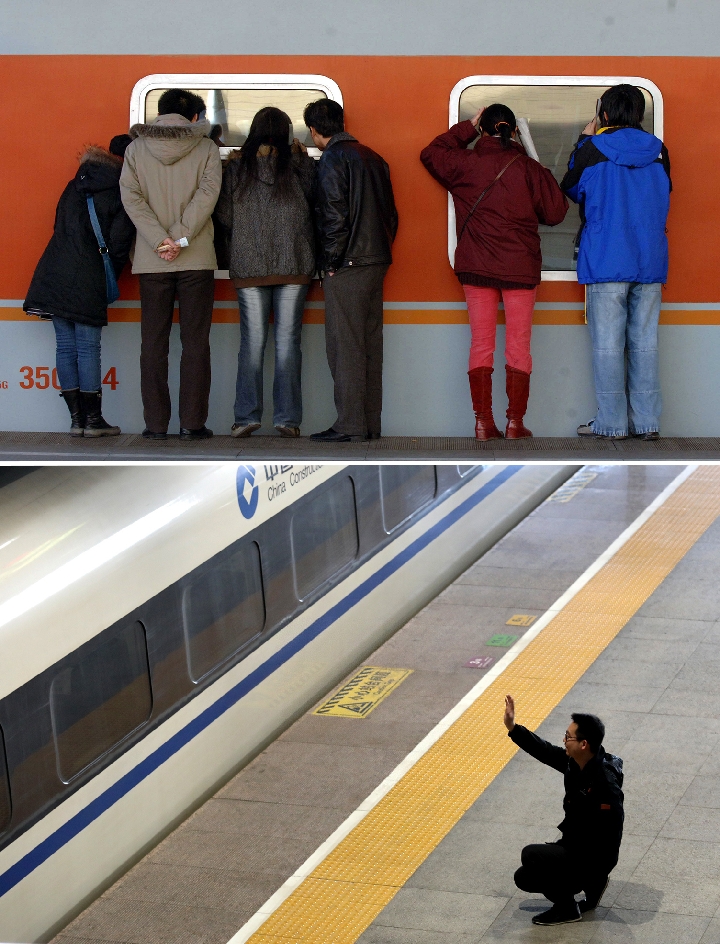
This combo photo shows people peeking through train windows as they see off friends and relatives at the Beijing Railway Station in Beijing, capital of China, Feb. 3, 2007 (top, photo taken by Li Wen); and a man waving goodbye to his family members who are aboard a departing train at the Shijiazhuang Railway Station in Shijiazhuang, north China's Hebei Province, Jan. 21, 2019 (bottom, photo taken by Liang Zidong).
Meanwhile, China has developed the world's largest real-time ticket service website, with nearly 3.5 billion tickets sold annually. New technologies including face scan check-in have been applied in many train stations.
This year, Yu bought his tickets online and said he is looking forward to checking in with facial recognition technology.
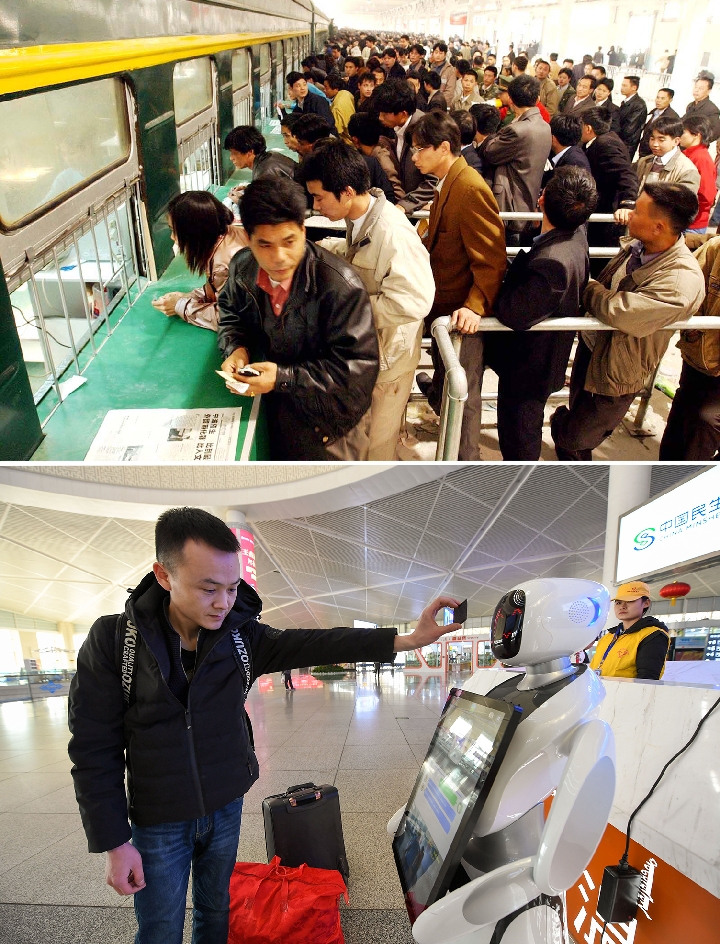
This combo photo shows railway passengers queuing up in front of a make-shift ticket office adapted from train compartments during the Spring Festival travel season in Guangzhou, south China's Guangdong Province, Jan. 20, 2003 (top, photo taken by Zhou Wenjie); and a passenger having his ticket scanned by a robot to get train information at the Hohhot East Railway Station during the Spring Festival travel season in Hohhot, north China's Inner Mongolia Autonomous Region, Jan. 22, 2019 (bottom, photo taken by Peng Yuan).
For veteran driver Zhou, he can still remember the days he would witness travelers carrying multiple bags while rushing to get on the train and secure enough room for their belongings. With neat and more spacious carriages, that chaos is rarely seen nowadays.
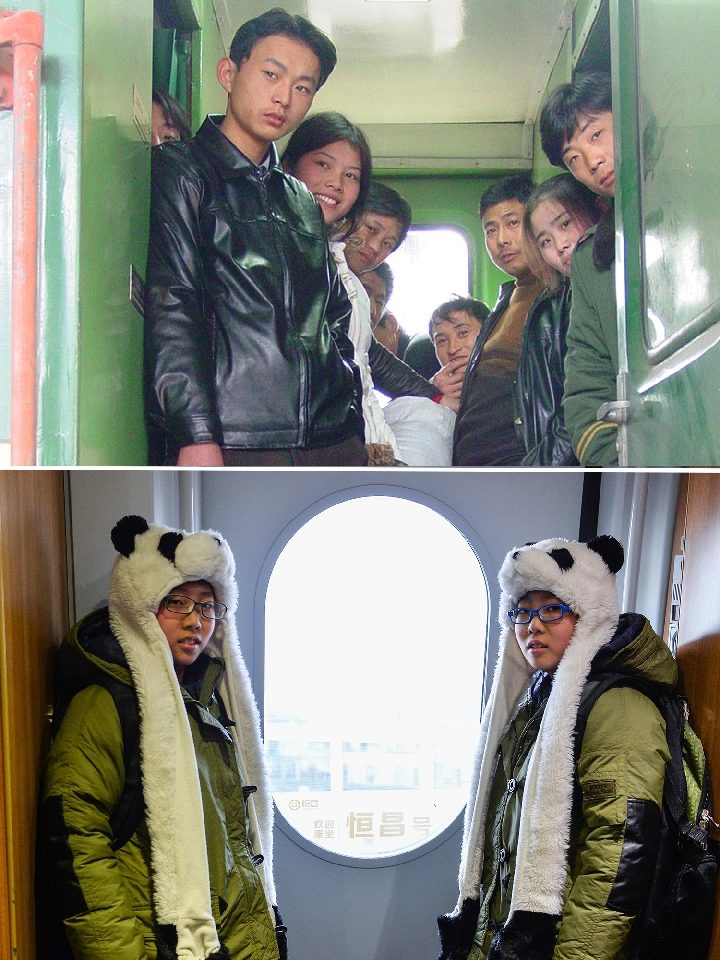
This combo photo shows passengers without seats looking out of a train traveling from Shanghai to Fuyang, as the train pulls into the Nanjing Railway Station in Nanjing, east China's Jiangsu Province, Jan. 7, 2004 (top, file photo); and twin brothers Liu Hong (L) and Liu Xiang standing next to the door of the train G118 while travelling from Rizhao, east China's Shandong Province to Beijing, capital of China, Jan. 24, 2016 (bottom, photo taken by Li Xiang).
"It all improved very quickly, just like the speed of the train," he said.
(Photo editors: Wang Jianhua, Xue Dongmei, Lin Fanjing, Niu Xiaolei and Li Mangmang; writer: Sun Xiaozheng; video editor: Ma Ping)



